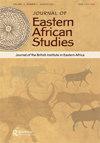革命的儿童:布隆迪非殖民化进程中城市穆斯林的公民身份
IF 0.6
3区 社会学
Q2 AREA STUDIES
引用次数: 2
摘要
非洲去殖民化的历史倾向于呈现一个单向的过程,最终的独立国家似乎是自然的结果,从而忽视或扭曲了具有跨国或跨地区议程的行动和行动者。在布隆迪的情况下,非殖民化要么被视为民族解放,要么被视为国家框架内种族冲突的前奏。这两股力量都掩盖了布隆迪独立的最初排斥,这打击了布隆迪城市中心的穆斯林或斯瓦希里少数民族。在这篇论文中,我展示了从1955年开始,坦噶尼喀湖畔的几个布隆迪城镇的穆斯林如何为他们最终被排除在外的国家的建立做出了重大贡献。因此,与法国大革命类似,布隆迪的非殖民化吞噬了它的后代。我继续解释,鉴于殖民当局和布隆迪民族主义者的排他性政治,一些穆斯林主角的政治立场如何逐渐分化。对这种地方和跨地方、国家和跨国历史的遗漏妨碍了对布隆迪和对布隆迪的理解。本文章由计算机程序翻译,如有差异,请以英文原文为准。
Children of the revolution: the citizenship of urban Muslims in the Burundian decolonization process
ABSTRACT Histories of decolonization in Africa tend to present a unidirectional process with the eventual independent states as the seemingly natural outcome, thus ignoring or distorting actions and actors with transnational or translocal agendas. In the case of Burundi, decolonization is presented either as national liberation or as a prelude to ethnic conflict within a national frame of reference. Both strands eclipse the initial exclusion of Burundian independence, which hit the Muslim or Swahili minority in Burundi’s urban centers. In this paper, I demonstrate how from 1955 onwards several Muslims in Burundian towns along Lake Tanganyika contributed significantly to the creation of a state from which they were eventually excluded. Thus, analogous to the French Revolution, the Burundian decolonization devoured its children. I continue explaining how political stances of some Muslim protagonists gradually diverged in light of the exclusionary politics of colonial authorities and Burundian nationalists. The omission of such local and translocal, national and transnational histories stands in the way of understanding – both of and in Burundi.
求助全文
通过发布文献求助,成功后即可免费获取论文全文。
去求助
来源期刊

Journal of Eastern African Studies
AREA STUDIES-
CiteScore
3.30
自引率
7.10%
发文量
12
期刊介绍:
Journal of Eastern African Studies is an international publication of the British Institute in Eastern Africa, published four times each year. It aims to promote fresh scholarly enquiry on the region from within the humanities and the social sciences, and to encourage work that communicates across disciplinary boundaries. It seeks to foster inter-disciplinary analysis, strong comparative perspectives, and research employing the most significant theoretical or methodological approaches for the region.
 求助内容:
求助内容: 应助结果提醒方式:
应助结果提醒方式:


